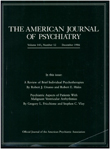Unexpected clinical features of the Tarasoff decision: the therapeutic alliance and the "duty to warn"
Abstract
The authors present a case report and discuss the clinical effects of the Tarasoff decision on the therapy of a potentially violent patient. They emphasize that the patient's ambivalence toward the intended victim can be used to foster the therapeutic alliance. The therapist's legal duty to the victim and therapeutic duty to the patient, they assert, can then be synergistically applied with an unexpected benefit: the patient's capacity to make choices is enhanced.
Access content
To read the fulltext, please use one of the options below to sign in or purchase access.- Personal login
- Institutional Login
- Sign in via OpenAthens
- Register for access
-
Please login/register if you wish to pair your device and check access availability.
Not a subscriber?
PsychiatryOnline subscription options offer access to the DSM-5 library, books, journals, CME, and patient resources. This all-in-one virtual library provides psychiatrists and mental health professionals with key resources for diagnosis, treatment, research, and professional development.
Need more help? PsychiatryOnline Customer Service may be reached by emailing [email protected] or by calling 800-368-5777 (in the U.S.) or 703-907-7322 (outside the U.S.).



